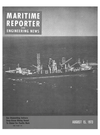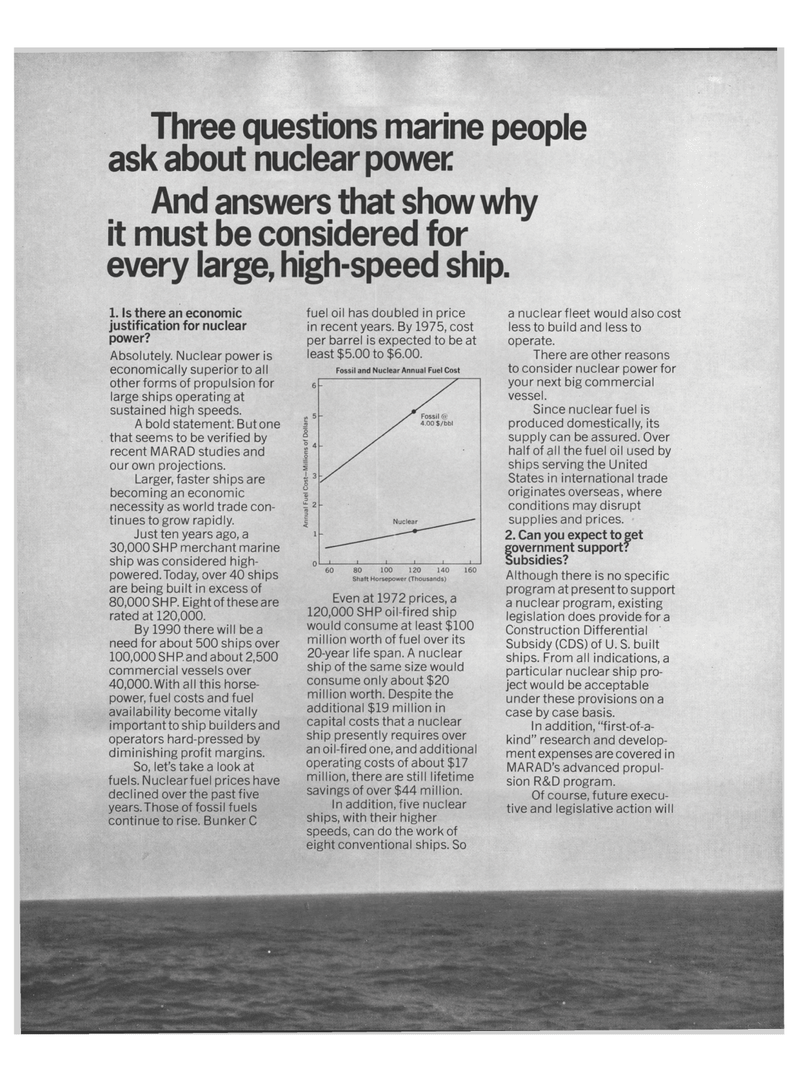
Page 20: of Maritime Reporter Magazine (August 15, 1973)
Read this page in Pdf, Flash or Html5 edition of August 15, 1973 Maritime Reporter Magazine
Three questions marine people ask about nuclear power:
And answers that show why it must be considered for every large, high-speed ship. 1. Is there an economic justification for nuclear power?
Absolutely. Nuclear power is economically superior to all other forms of propulsion for large ships operating at sustained high speeds.
A bold statement. But one that seems to be verified by recent MARAD studies and our own projections.
Larger, faster ships are becoming an economic necessity as world trade con- tinues to grow rapidly.
Just ten years ago, a 30,000 SHP merchant marine ship was considered high- powered. Today, over 40 ships are being built in excess of 80,000 SHP. Eight of these are rated at 120,000.
By 1990 there will be a need for about 500 ships over 100,000 SHP.and about 2,500 commercial vessels over 40,000. With all this horse- power, fuel costs and fuel availability become vitally importanttoship buildersand operators hard-pressed by diminishing profit margins.
So, let's take a look at fuels. Nuclearfuel prices have declined over the past five years.Those of fossil fuels continue to rise. Bunker C fuel oil has doubled in price in recent years. By 1975, cost per barrel is expected to be at least $5.00 to $6.00.
Fossil and Nuclear Annual Fuel Cost 80 100 120 140
Shaft Horsepower (Thousands)
Even at 1972 prices, a 120,000 SHP oil-fired ship would consume at least $100 million worth of fuel over its 20-year life span. A nuclear ship of the same size would consume only about $20 million worth. Despite the additional $19 million in capital costs that a nuclear ship presently requires over an oil-fired one, and additional operating costs of about $17 million, there are still lifetime savings of over $44 million.
In addition, five nuclear ships, with their higher speeds, can do the work of eight conventional ships. So a nuclear fleet would also cost less to build and less to operate.
There are other reasons to consider nuclear power for your next big commercial vessel.
Since nuclearfuel is produced domestically, its supply can be assured. Over half of all the fuel oil used by ships serving the United
States in international trade originates overseas, where conditions may disrupt supplies and prices. 2. Can you expect to get government support?
Subsidies?
Although there is no specific program at present to support a nuclear program, existing legislation does provide for a
Construction Differential
Subsidy (CDS) of U.S. built ships. From all indications, a particular nuclear ship pro- ject would be acceptable under these provisions on a case by case basis.
In addition, "first-of-a- kind" research and develop- ment expenses are covered in
MARAD's advanced propul- sion R&D program.
Of course, future execu- tive and legislative action will

 19
19

 21
21
